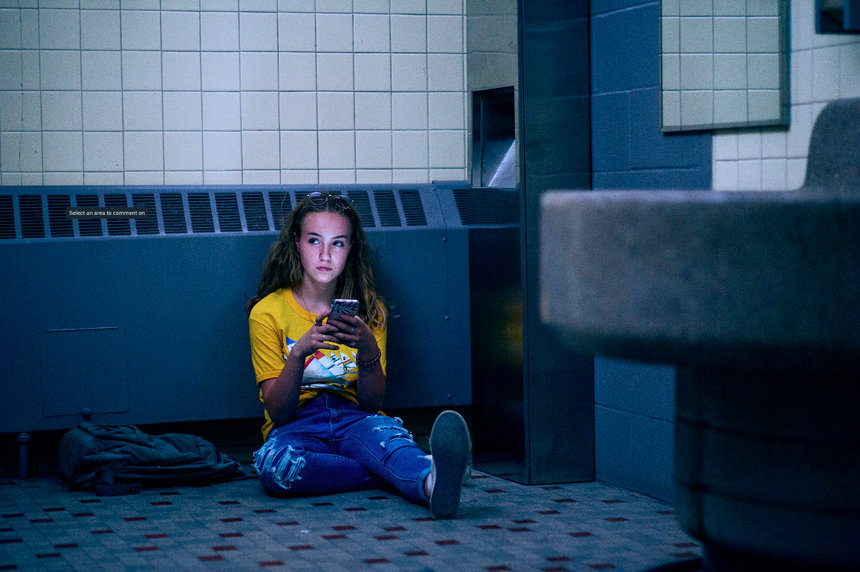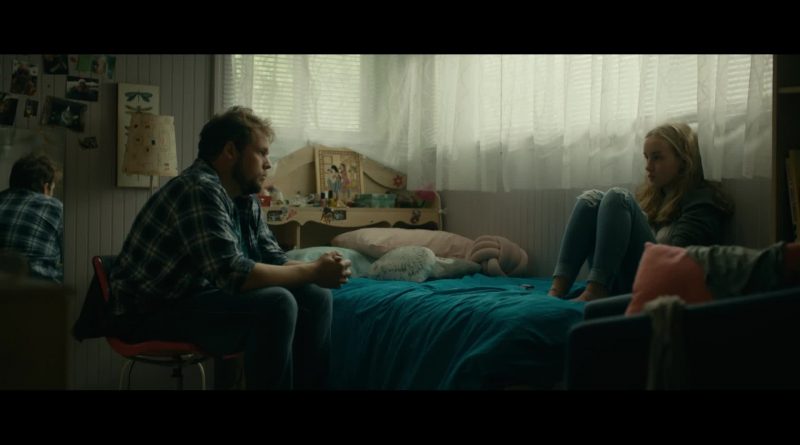Review: LES NÔTRES, A Monster Protected, A Girl Shamed

I've never understood how the myth persists that small towns are somehow better places than cities; the idea that a smaller community is more loving and caring, with less crime (perhaps true but solely by virtue of their being fewer people), people who look after each other, everyone knows each other. It's small towns that tend to breed ignorance, where the monsters hide in plain sight, and those who should be supported are shunned and shamed.
Jeanne Leblanc's sophomore feature shines a harsh light on a small town in Québec, one where something that should have brought the community together, ends up ruining the lives of several people. Les Nôtres translates as 'Our Own': that's the impression small communities want to give, that they look after their own. But it all depends on what's happened, and who is the victim, and who is to blame; those who are deemed worthy of protection more often than not, those that cause the harm. And those who are harmed, are left to fend for themselves.
Five years ago, the town of Saint Adeline suffered a terrible tragedy. The collapse of a factory, and the loss of life, was devastating; but it seems the community rallied. Isabelle (Marianne Farley) lost her husband, but with the help of her neighbour and the town mayor Jean-Marc (Paul Doucet), with whom she initiated a memorial project there is hope on the horizon. That is, until it's discovered that her 13-year-old daughter Magalie (Emilie Bierre) is pregnant.
Magalie, once a seemingly typical young teenager, with a good group of friends, and a body that's barely finished puberty, finds herself in a terrible and lonely position. She refuses to name the father, whom she has refered to as 'Taz' to her friends, her secret lover. Isabelle is at first kind and caring, then angry when her daughter refuses to name the man; now in the position of single parent, she at once needs to know who he is, and is fearful of driving her daughter away. Meanwhile, her 'friends' immediately label her a slut, adults move away from Isabelle, and the sexist and racists norms that small towns try to hide, become clearer.
Leblanc does not make the audience wait long to find out who 'Taz', and his identity as a middle-aged and powerful figure in the town is both a shock and completely unsurprising. It becomes a secret between us and Magalie; but we are not in a position to help her, so watching what she must endure at the hands of him and her community is agonizing. Like her mother, we want to protect her and scream at her. Bierre's performance is outstanding, finding that line between a girl still young enough to think she has control, but soon realizing the mistakes she's made, but more to the point, how the adults in her life become unreliable. Magalie's frequent blank stare hides a storm of emotional turmoil and confusion; the adults who are supposed to protect her have failed, her friends have mostly deserted her, and only she is truly forced to deal with the consequences of a man's criminal actions.
Leblanc shows how everyone exists, how everyone looks, how everyone listens through mirrors and behind doors. No one, it seems, it willing to tell the truth, or face their actions head-on. Even the social worker assigned to Magalie can't say what needs to be said, and the few times her mother tries, her words are spoken in anger. We see reflections as oppose to identities, especially with the adults, as they end up shirking their collective responsibility to the children of their community. In the long run, the only ones that Magalie can depend on are other marginalized teenagers, those who are scapegoats for other reasons, but scapegoats and victims of white patriarchal power as well.
When a community says it protects 'its own', what it means is those in power, those who are white, middle and upper class, and male, for the most part. Magalie, as a young white girl, will be shamed for a while, then accepted to a certain degree (though always treated with slight disdain and shame). But Taz knows what power he says; he has perfectly played his emotional manipulation and abuse of Magalie, committing statutory rape and making it look like love, and not only dumping her when it suits him, but making it clear that he will do everything in his power to force all responsibility and shame on her, to the point of having a teenager, and more importantly, a teenager of colour, blamed for the crime. For not only will this community quickly label any woman who doesn't conform to the patriarchy a slut, they will jump at the chance to blame anyone who isn't white.
While it's hard to dismiss the fact that not a single person in the story suggests a paternity test (an easily available and useful tool in a situation such as this), Leblanc expertely and effectively strips away the veneer of community solidatiry, showing how it's only a privileged few who are truly protected. Les Nôtres finished on something of an unsatisfactory but realistic note, but such is the story that knows that sadly this is still common in small communities, those that only pretend to have everyone's best interests at heart.
Les Nôtres will be released on demand and in select theatres on June 18th from Oscilloscope Laboratories.
Les n�tres
Director(s)
- Jeanne Leblanc
Writer(s)
- Judith Baribeau
- Jeanne Leblanc
Cast
- Emilie Bierre
- Marianne Farley
- Judith Baribeau








